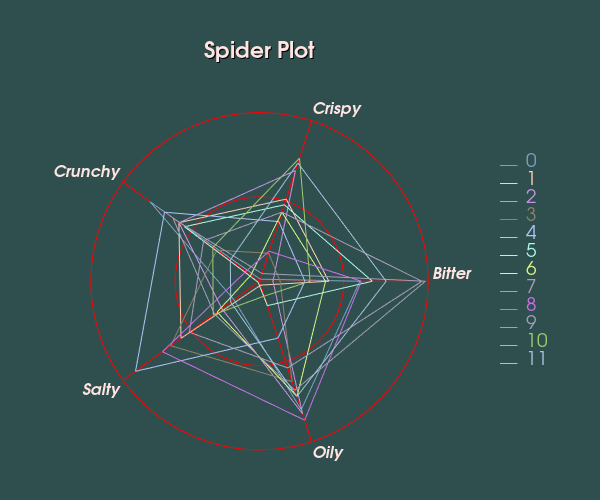SpiderPlot
Repository source: SpiderPlot
Description¶
A spider plot is used to display multivariate data. See this wikipedia article for more information.
Question
If you have a question about this example, please use the VTK Discourse Forum
Code¶
SpiderPlot.py
#!/usr/bin/env python3
from dataclasses import dataclass
# noinspection PyUnresolvedReferences
import vtkmodules.vtkInteractionStyle
# noinspection PyUnresolvedReferences
import vtkmodules.vtkRenderingOpenGL2
from vtkmodules.vtkCommonColor import vtkNamedColors
from vtkmodules.vtkCommonCore import (
vtkFloatArray,
vtkMinimalStandardRandomSequence
)
from vtkmodules.vtkCommonDataModel import vtkDataObject
from vtkmodules.vtkRenderingAnnotation import vtkSpiderPlotActor
from vtkmodules.vtkRenderingCore import (
vtkRenderWindow,
vtkRenderWindowInteractor,
vtkRenderer
)
def main():
colors = vtkNamedColors()
num_tuples = 12
bitter = vtkFloatArray(number_of_tuples=num_tuples)
crispy = vtkFloatArray(number_of_tuples=num_tuples)
crunchy = vtkFloatArray(number_of_tuples=num_tuples)
salty = vtkFloatArray(number_of_tuples=num_tuples)
oily = vtkFloatArray(number_of_tuples=num_tuples)
rand_seq = vtkMinimalStandardRandomSequence()
rand_seq.seed = 8775070
for i in range(num_tuples):
bitter.SetTuple1(i, rand_seq.GetRangeValue(1, 10))
rand_seq.Next()
crispy.SetTuple1(i, rand_seq.GetRangeValue(-1, 1))
rand_seq.Next()
crunchy.SetTuple1(i, rand_seq.GetRangeValue(1, 100))
rand_seq.Next()
salty.SetTuple1(i, rand_seq.GetRangeValue(0, 10))
rand_seq.Next()
oily.SetTuple1(i, rand_seq.GetRangeValue(5, 25))
rand_seq.Next()
dobj = vtkDataObject()
dobj.field_data.AddArray(bitter)
dobj.field_data.AddArray(crispy)
dobj.field_data.AddArray(crunchy)
dobj.field_data.AddArray(salty)
dobj.field_data.AddArray(oily)
actor = vtkSpiderPlotActor(title='Spider Plot', input_data=dobj, legend_visibility=True,
independent_variables=SpiderPlotActor.IndependentVariables.VTK_IV_COLUMN)
actor.position_coordinate.value = (0.05, 0.1, 0.0)
actor.position2_coordinate.value = (0.95, 0.85, 0.0)
actor.property.color = colors.GetColor3d('Red')
actor.axis_label = (0, "Bitter")
actor.axis_range = (0, 1, 10)
actor.axis_label = (1, "Crispy")
actor.axis_range = (1, -1, 1)
actor.axis_label = (2, "Crunchy")
actor.axis_range = (2, 1, 100)
actor.axis_label = (3, "Salty")
actor.axis_range = (3, 0, 10)
actor.axis_label = (4, "Oily")
actor.axis_range = (4, 5, 25)
actor.legend_actor.number_of_entries = num_tuples
for i in range(num_tuples):
r = rand_seq.GetRangeValue(0.4, 1.0)
rand_seq.Next()
g = rand_seq.GetRangeValue(0.4, 1.0)
rand_seq.Next()
b = rand_seq.GetRangeValue(0.4, 1.0)
rand_seq.Next()
actor.plot_color = (i, r, g, b)
actor.title_text_property.color = colors.GetColor3d('MistyRose')
actor.label_text_property.color = colors.GetColor3d('MistyRose')
ren = vtkRenderer(background=colors.GetColor3d('DarkSlateGray'))
ren_win = vtkRenderWindow(size=(600, 500), window_name='SpiderPlot')
ren_win.AddRenderer(ren)
iren = vtkRenderWindowInteractor()
iren.render_window = ren_win
ren.AddActor(actor)
iren.Initialize()
ren_win.Render()
iren.Start()
@dataclass(frozen=True)
class SpiderPlotActor:
@dataclass(frozen=True)
class IndependentVariables:
VTK_IV_COLUMN: int = 0
VTK_IV_ROW: int = 1
if __name__ == '__main__':
main()
